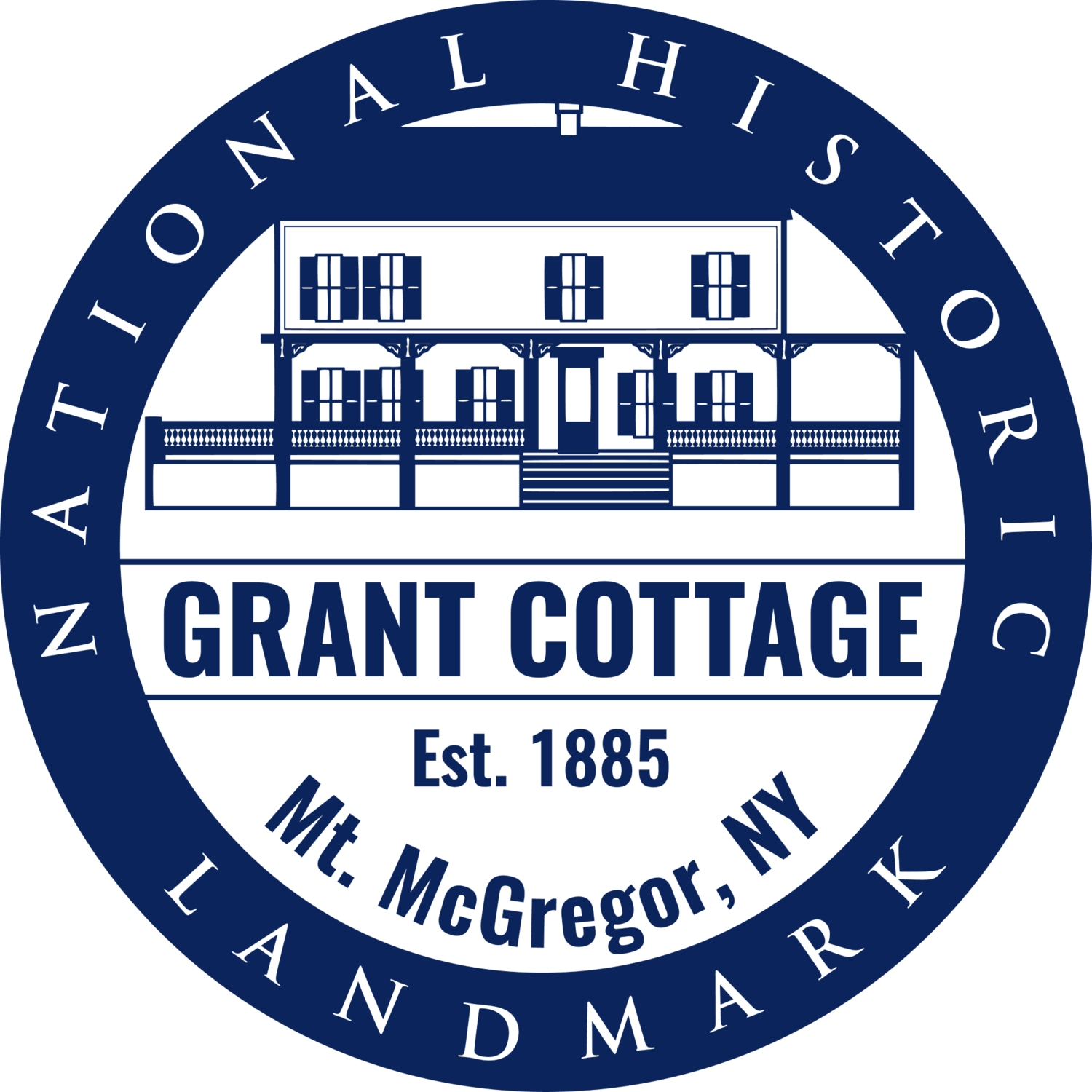A Lasting Peace Forged at Appomattox
by Ben Kemp, Grant Cottage Site Coordinator
In the spring of 1885 as an ailing Ulysses Grant sat at Drexel Cottage on Mt. McGregor contemplating his legacy, he received many heartwarming letters of support. Though the surrender of General Robert E. Lee’s Army of Northern Virginia at Appomattox Court House, VA had occurred 20 years before it was fresh in his mind since he had just written about it for his memoirs.
At the April 9th, 1865, surrender Grant displayed the same theme he had throughout the war when dealing with his defeated foe, a desire for reconciliation over retribution. President Lincoln had further reinforced this in a meeting only weeks before the surrender urging leniency when the time came. Lincoln believed it would be ideal for the southern soldiers to be allowed to return to their farms and shops in order to begin the process of healing the nation. As Grant and Lee sat at the Wilmer McLean home drafting the articles of surrender, Lee proposed that Grant allow his men to keep their side arms and horses for use on their farms. Grant agreed that “most of the men in the [Confederate] ranks were small farmers.” And with their horses “they would be able to put in a crop to carry themselves and their families through the next winter.” Grant was offering very generous terms for the southern soldiers. Lee remarked that “This will have the best possible effect upon the men. It will be very gratifying, and will do much toward conciliating our people.” Lee stated that many in his army were in severe need of food and supplies. Grant in a further show of respect and reconciliation offered the services of the U.S. commissary and quartermaster to supply the beleaguered southerners.
As the Union army heard the news of the surrender spontaneous demonstrations of gun salutes commenced. Grant hearing them and not wanting to add insult to defeat sent orders to have them stopped stating, “The war is over; the rebels are our countrymen again.”
On June 30, 1885, A. M. Arnold from Rockbridge Baths, Va. wrote a letter to Grant stating:
Alfred Waud "Sharing Rations"
"I hope you will allow one who, when but a boy, laid down his arms at Appomattox and gave in his allegiance to the Union, to express his warmest sympathy for you in this your hour of affliction. Dear General, I have watched your movements from the hour you gave me my horse and sword and told me to go home and 'assist in making a crop'—I have been proud to see the nation do you honor—And now, dear Genl in this the hour of your tribulation I weep that so brave, so magnanimous a soul must suffer as you do—My prayer to God daily is that you dear General, may be restored to perfect health. And be assured that I am not the only ex-confederate who sends his prayers daily to the throne of Grace for the restoration of the Grandest, the noblest the bravest Soldier and the Purest Statesman whoever graced the annals of history. May the God who overlooked you in battle and who has brought you thus far give you grace to meet whatever He has in store for you And may He Restore you to health & friends is the fervent prayer of one who at 16 years of age entered the lists against you and accepted the magnanimous terms you accorded us at Appomattox.”
This sentiment was echoed in resolutions such as the one by the Confederate Survivors Association:
“Remembering him now as the generous victor who, at the ever memorable meeting at Appomattox…conceded liberal and magnanimous terms of surrender, do we…respectfully tender to General Grant assurances of our sincere and profound sympathy in this season of his direful extremity.”
Grant in his final weeks was touched by many letters such as these, writing shortly before his death:
“I am… thankful… to see for myself the happy harmony that has sprung up between those engaged but a few short years ago in deadly conflict. It has been an inestimable blessing to me to hear the kind expression towards me…of Confederate and National troops alike.…”
“My expected death called forth expressions of the sincerest kindness from all the people of all the sections of the country. The Confederate soldier vied with the Union soldier in sounding my praise.”
“I feel that we are on the eve of a new era, where there is to be a great harmony between the Federal and Confederate. I cannot stay to be a living witness to the correctness of this prophecy; but I feel within me that it is to be so. The universally kind feeling expressed for me at a time when it was supposed that each day would be my last, seemed to me to be the beginning of the answer to ‘Let us have peace.’”
Grant would state that "Although a soldier by profession, I have never felt any sort of fondness for war, and I have never advocated it, except as a means of peace." More than his military prowess it is the respect and desire for reconciliation that Grant displayed throughout the war that would earn him the respect of former Confederates like A.M. Arnold.
Eastern Overlook, Mt. McGregor
Grant truly saw himself as a man of peace at his core. In his final days on Mt. McGregor Grant enjoyed viewing the vast peaceful valley below him. Perhaps he took some comfort in the thought that he was partly responsible for the domestic peacefulness that existed and would be the inheritance of future generations of Americans both north and south.
“It is not enough to win a war; it is more important to organize the peace.”
-Aristotle






